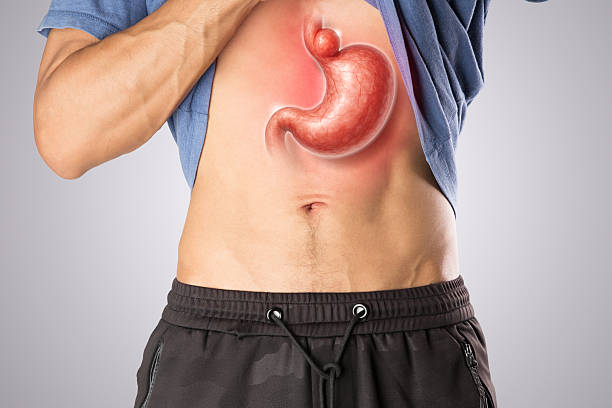03 Feb 2026
Rhinoplasty Revision Surgery in Mohali: Cost When Your First Nose Job Fails


Dr. Sunil Garg
06 Sep 2025
Call +91 80788 80788 to request an appointment.
A hiatal hernia, a condition that happens when a part of the stomach pushes upward through the diaphragm into the chest cavity, can influence various bodily functions, including cardiac function. The involution of the stomach can exert pressure on nearby structures, potentially affecting the heart's activities. In Punjab, where an increasing number of individuals are being diagnosed with hiatal hernias, it is vital for patients and their families to understand how this condition could indirectly affect heart health. This blog will explore the intricate relationship between hiatal hernias and cardiac function, focusing on insights from health experts at Livasa Hospitals, a leading healthcare provider with locations in Nawanshar, Mohali, Khanna, Hoshiarpur, and Amritsar.
A hiatal hernia occurs when the upper part of the stomach bulges through an opening in the diaphragm, known as the hiatus. While it may sound alarming, hiatal hernias are not uncommon and often go unnoticed. There are two main types of hiatal hernias:
Both types can result in symptoms like heartburn, regurgitation, and chest pain, which, while related to digestive issues, can also mimic cardiac problems. This overlap can sometimes make diagnosis challenging without proper medical evaluation.
Hiatal hernias can affect cardiac function in several ways. The most direct impact comes from the pressure exerted on the diaphragm and adjacent structures, potentially affecting the heart and lungs. In Punjab, where lifestyle and dietary habits may contribute to obesity—a risk factor for hernias—understanding these implications is crucial.
Common cardiac issues due to hiatal hernia include:
Understanding the causes and risk factors associated with hiatal hernias is essential for early diagnosis and management. Factors contributing to the development of a hiatal hernia include:
Hiatal hernias often present with symptoms that can be easily confused with other conditions, particularly cardiac issues. Common symptoms include:
For residents of Punjab, accurate diagnosis involves gastroenterological evaluation, often with endoscopy, barium swallow radiographs, or esophageal manometry tests. Patients experiencing persistent symptoms should seek consultation at Livasa Hospitals, known for effective hernia diagnosis and treatment.
Treatment for hiatal hernias varies based on the severity of symptoms and the type of hernia. Options typically include:
| Treatment Type | Benefits | Considerations |
|---|---|---|
| Lifestyle Changes | Reduced symptoms through diet and weight management. | Requires ongoing commitment and monitoring. |
| Medications | Help reduce acid production, relieving symptoms. | May have side effects; not suitable for everyone. |
| Surgery | Corrects anatomical problems, usually low recurrence risk. | Requires recovery time; potential surgical risks. |
Residents in Punjab considering treatment can consult with experts at the Livasa Nawanshar and other centers for personalized recommendations and care plans.
While not all hiatal hernias can be prevented, certain lifestyle adjustments can significantly lower risks and reduce symptoms for those already affected. These include:
These measures are particularly relevant for individuals in Punjab, where local dietary customs can influence gastric health. Guidance from dietitians at Livasa Hospitals can further support these efforts.
Livasa Hospitals lead in offering advanced surgical options for hiatal hernia correction, employing minimally invasive techniques that ensure faster recovery and reduced complications. Notable techniques include laparoscopic surgeries, which are less traumatic than traditional methods.
Why consider Livasa Hospitals for hiatal hernia surgery in Punjab?
Understanding how a hiatal hernia can affect cardiac function is crucial for patients in Punjab dealing with this condition. It underscores the importance of accurate diagnosis, effective treatment, and proactive lifestyle management to mitigate potential health impacts.
Patients are encouraged to seek expert guidance and treatment at Livasa Hospitals across various locations, including Nawanshar, Mohali, and Hoshiarpur, to ensure they receive the best care for both hiatal hernia and associated cardiac implications.
For more information or to book a consultation, visit our appointment page or contact us at +91 80788 80788.
Rhinoplasty Revision Surgery in Mohali: Cost When Your First Nose Job Fails
Plastic Surgery After Massive Weight Loss: Body Contouring Packages in Mohali
ENT + Cosmetic in Mohali: Septoplasty for Breathing with Cosmetic Rhinoplasty Offers
Livasa Healthcare Group Corporate Office,Phase-8, Industrial Area, Sector 73, Sahibzada Ajit Singh Nagar, Punjab 160071
| Mohali | +91-99888 23456 |
| Amritsar | +91-99887 49494 |
| Hoshiarpur | +91-99883 35353 |
| Nawanshahr | +91-75081 82337 |
| Khanna | +91-98888 05394 |